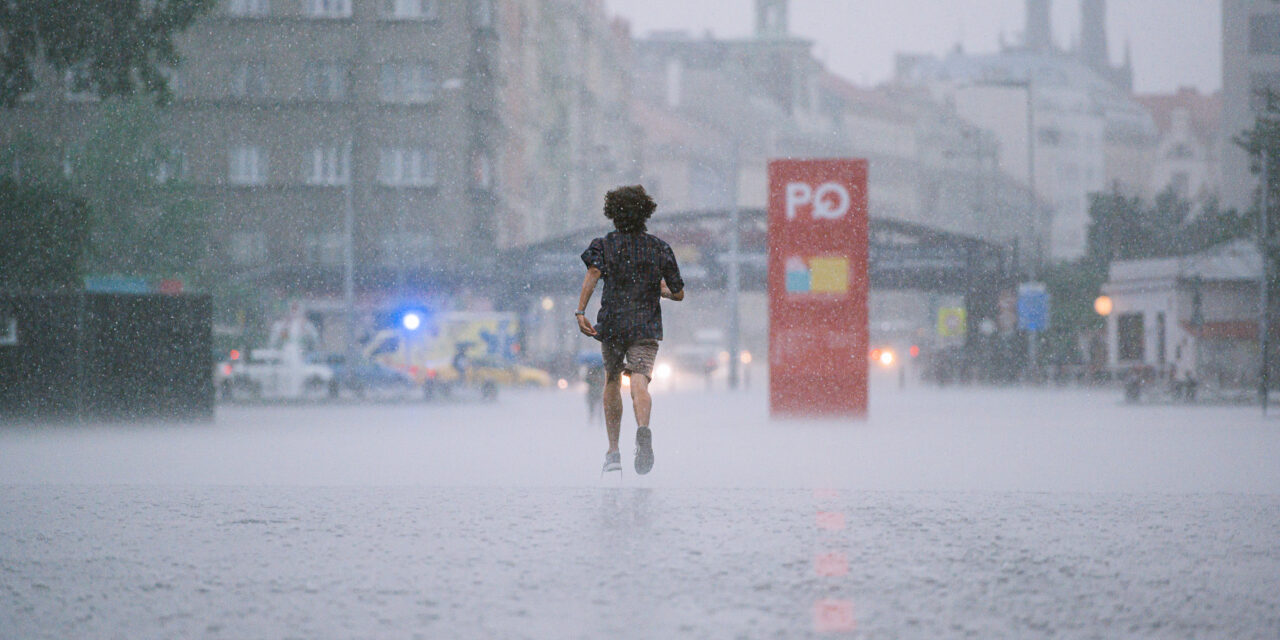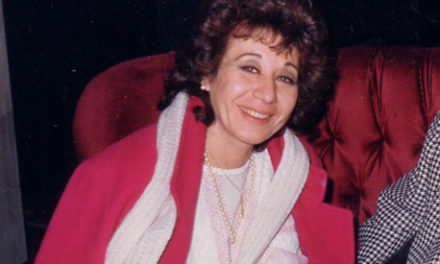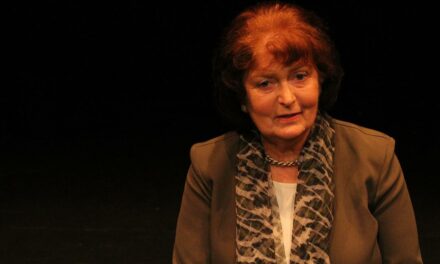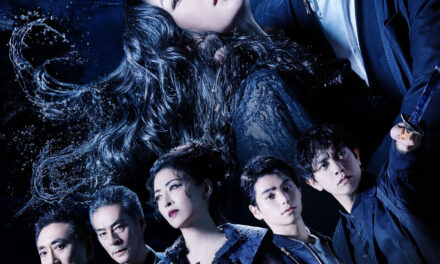The headquarters of the PQ is the Exhibition Grounds, but that’s not its boundaries. Between the giant central hall, the adjacent Lapidarium museum and the enormous Stromovka park on which the grounds are set, there’s plenty of space for performances to take place. But a satellite performance space is at DAMU, the Theatre Faculty of the Academy of the Performing Arts. Other events are happening at the DOX Centre for Contemporary Arts, the Museum of the City of Prague and even the Národní Divadlo, the National Theatre. If that weren’t enough to keep track of, many of the festival’s participants have designed site-specific performances which take place in non-traditional sites chosen to their specifications. I’m really glad to see this on the program as all too often, visiting a city for a conference or festival limits our knowledge of the larger city around us. The day’s activities are often so draining, it’s all we can do to have dinner in the hotel restaurant before collapsing. Visitors to the PQ get a unique perspective on Prague as compared to other visitors. We see what the city does best – welcome and celebrate creativity.
With ten days’ of performances happening all over the city, there’s a lot to keep track of, and while both the printed program and the website are visually striking, they leave something to be desired in terms of basic information. In the past two days, I’ve been closed out of four performances I tried to attend. The first two, yesterday, were because I didn’t understand that in addition to securing a press accreditation, I had to reserve tickets to individual performances. Probably that’s my fault; I’m notoriously lackadaisical when it comes to reading instructions. The third, today, was because I followed the instructions I was given verbally yesterday about the process of reserving tickets, but it turned out to be incorrect.
The fourth, also today, came after I hustled across town for a site-specific performance. I was desperate to attend a performance – my goal is to attend at least one every day – and this one was not ticketed. It should have been no problem. I had trouble finding the site, but once I arrived, I noticed other participants of the PQ there waiting. We identified each other by certain visual markers, such as lanyards around our necks from which hang our bright yellow ID badges, beige tote bags with color-blocks and the name of the festival, and a generally bewildered expression. After a while, we found out the performance had been canceled. We stayed long enough to inform the next participant who arrived, and then scattered.
I have never organized a large-scale theatre festival (or a small-scale one for that matter) so I can’t imagine the amount of work that goes into it. But every time I’ve turned to the staff with a question or frustration, I’ve heard “Yes, many people have been experiencing that.” So at the risk of plan-splaining, I would like to humbly offer some suggestions:
- The process of reserving tickets can be explained when guests pick up their accreditation or tickets;
- Both the program and the website can contain detailed maps with the names and, where possible, addresses of all venues (the site-specific performance I attempted to attend was planned for a place called “Kozí plácek,” a place which appears on no maps because it is the colloquial name of an intersection. The map provided by the festival represents the plan of the city, but has no street names);
- There can be a centralized source of information for when performances are canceled or postponed. Maybe an app?
Two things kept me from falling into a completely foul mood over these frustrations. One was that even without attending formal performances, there is plenty to see. The Lapidarium is the part of the National Gallery which houses statuary that once stood in the city and now, for a variety of reasons (political change, concerns for the value of historico-artistic objects left to the elements) are safeguarded in the museum. For the duration of the festival, scenery maquettes are installed in the Lapidarium and the lights are trained only on these models, while statues lurk in the shadows. For anyone who grew up reading From the Mixed-up Files of Mrs. Basil E. Frankweiler and harbors a fantasy of being locked overnight in a museum, the installations at the Lapidarium will get you there. And out on the central concourse, there are movement pieces called Formations and interactive sculptural installations. At the PQ, there’s always something to do.
The other thing that saved me was the kindness of the staff. The press office has been amazingly helpful and responsive, and I know I am one of the dozens of people whose issues they have to worry about. The ground crew is fantastic too. When I went to the Info Center, holding back tears after being closed out of a site-specific performance I was really looking forward to (“Porous City” by Etheridge & Persighetti), I was so upset, I was on the verge of busting out the voice Two Dope Queens comics Jessica Williams and Phoebe Robinson ridicule as white ladies at customer service, “Never in my life!” But the people behind the desk were genuinely concerned and sympathetic. One even shared that, as a working photographer, she’s been struggling to access the events she needs to attend for her work. When I repeated the information I’d been given about reserving tickets, she said, “You’ve been badly mystified,” disarming me with a single expressive word.
At the Kozí plácek, too, one of the would-be audience members was a festival volunteer. The clueless rest of us would probably have waited around for quite a while, becoming increasingly agitated while waiting for performers to appear around some unexpected corner. But she made a quick call, got the information and let us get on with our day. In the absence of an app, thank goodness for the helpful staff.
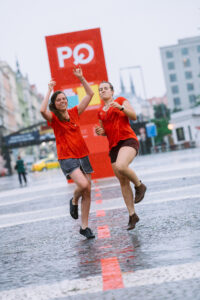
Cheerful chaos. Photo by Jan Hromadko.
And really, I don’t want a mobile app that would replace these human interactions, but supplement them. Because unexpected situations always arise – weather, illness, getting lost – an I’ll take a well-trained staff over an algorithm any day. What’s more, a computer can neither sympathize with you or share your excitement.
When a theatre festival takes over a whole city, your eye becomes trained to performances happening everywhere. That performance on Kozí plácek never happened, but on my walk back to where I’m staying, I saw a man in a spandex bodysuit decorated with the Canadian map climbing a light-post as his stag party friends watched and filmed. Yesterday, on my way to DAMU, I saw a middle-aged man outside the film school reading forcefully from the Bible in the accent of the American South. Most people passed by ignoring him but one woman was filming him. She kept an eye on the passersby, and on him, and kept her cell phone camera steady the whole time. Was she the director of this film, or his supportive wife, or an unknown sinner he was in the process of saving? Certain explanations are more probable than others. Still, it was a remarkable performance.
Going forward, I’ll do my best to properly reserve tickets and figure out ahead of time where the venues are. But when things go wrong, as they inevitably will, I’m glad to know I can rely on a helpful festival staff, and a city full of drama.
This post was written by the author in their personal capacity.The opinions expressed in this article are the author’s own and do not reflect the view of The Theatre Times, their staff or collaborators.
This post was written by Abigail Weil.
The views expressed here belong to the author and do not necessarily reflect our views and opinions.

